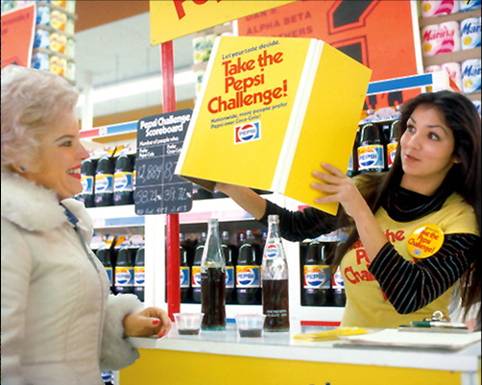Fair Use Doctrines Protect Lawful Use of Another's Trademark
 The Pepsi Challenge: Made possible by comparative fair use
The Pepsi Challenge: Made possible by comparative fair use
We covered fair use today in my trademark class, and it occurred to me I haven’t talked about it much here.
Fair use, in all its flavors, is a defense to trademark infringement and a host of other forms of trademark wrongs. It’s the First Amendment winning out in the tension between freedom of speech and the right of a trademark owner to avoid infringement, dilution, cybersquatting, and unfair competition.
Here’s a quick review (or introduction) to the most recognized forms of fair use.
Classic Fair Use - Also known as “statutory fair use” since it’s codified in the Lanham Act, classic fair use is the descriptive use of words that happen to be someone else’s trademark. Just because someone uses it as a descriptive trademark doesn’t mean you can’t use it to accurately describe your good or service. For example, if true, I can say my coffee is both the best and is from Seattle notwithstanding the SEATTLE’S BEST COFFEE trademark.
Collateral Use - Use of a mark that does not claim sponsorship of goods. It’s ok to say that you’re selling reconditioned FORD trucks as long as you don’t suggest your refurbishments are factory authorized.
Comparative Use - Use of another’s trademark to identify the mark owner’s product in comparative advertising. As long as the comparison isn’t misleading, it’s perfectly ok to compare PEPSI to COKE.
Nominative Fair Use - Nominative fair use uses the plaintiff’s trademark to refer to plaintiff’s good or service. If there’s no other reasonable way to refer to the plaintiff’s good or service, it’s ok to use the plaintiff’s mark to do so as long as you don’t use more of the mark than is necessary and don’t imply any connection with the plaintiff. For example, it’s ok to say the SEATTLE SUPERSONICS, rather than “that professional basketball team that left town and hopefully will come back.”
Critique or Reporting Fair Use - Traditional First Amendment use is also carved out of the Lanham Act, so you report on, talk about, criticize, or parody any trademark by name. This is what allows Yelp to exist.
Remember, these are not immunities; they are defenses to violations of the Lanham Act. That means they’re something to invoke if accused of engaging in a trademark wrong. But they also carve out activity that is perfectly legal.
Reader Comments